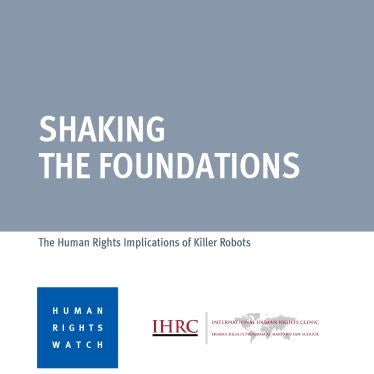February 16, 2007
Attention: Foreign Policy and Defense Aides
Dear Senator,
We, the undersigned organizations, write to urge you to address a pressing humanitarian issue: the indiscriminate and lasting effects of cluster munitions on civilian populations. On February 14, Senators Dianne Feinstein (CA), Patrick Leahy (VT), and others introduced S.594, the "Cluster Munitions Civilian Protection Act of 2007," that bans both the use of cluster munitions in or near civilian populated areas and the use, sale, and transfer of cluster munitions with a failure rate of more than 1 percent. Please cosponsor S.594 and support clear, sensible US policy on cluster munitions.
We are alarmed by the many well-documented reports illustrating the grave danger posed by cluster munitions to civilians in conflict situations. These indiscriminate weapons scatter deadly explosives over wide areas of land, making it very difficult to avoid civilian casualties. Moreover, while they are designed to explode on impact, many of the submunitions initially fail to detonate, leaving behind large numbers of hazardous explosive "duds" that are akin to landmines, injuring and killing civilians and contaminating the land long after conflicts.
The US maintains a stockpile of close to 1 billion submunitions and has used inaccurate and unreliable cluster munitions in Afghanistan, Cambodia, Iraq, Laos, and the former Yugoslavia, often with disastrous human consequences. In its 2004 report "Explosive Remnants of War: The Lethal Legacy of Armed Conflict", the International Committee of the Red Cross (ICRC) estimated that in Laos alone, between 9 million and 27 million unexploded submunitions remain. Some 11,000 people have been killed or injured since the conflict ended, more than 30 percent of whom have been children.
Although US cluster munitions procured after FY 2005 are required to have a failure rate of less than 1 percent, no restrictions to date have been placed on the use or export of existing, inaccurate stockpiles. Additionally, current US policy does not restrict the use of these weapons in civilian areas. S.594 addresses both concerns by limiting the use of cluster munitions to only clearly defined military targets and by prohibiting any US funds from being spent to use, sell, and transfer cluster munitions unless the submunitions have a 99 percent or higher functioning rate.
The humanitarian suffering that continues in countries plagued by the lasting effects of cluster munitions underlines the urgent need to curb the misuse of these inhumane weapons. As it has done in the past in relation to antipersonnel mines and conventional arms transfers, Congress can play a vital role by shaping a US military policy commensurate with the values of its people. Please cosponsor S.594 and lend your voice to the growing number of humanitarian, human rights, and arms control organizations urging the US to halt the use, sale, and transfer of unreliable, inaccurate cluster munitions that cause unacceptable harm to civilians.
Thank you for your attention to this important humanitarian issue.
Sincerely,
American Friends Service Committee
Amnesty International USA
Arms Control Association
Arms Trade Resource Center, World Policy Institute
Friends Committee on National Legislation (Quakers)
Global Green USA (The US Affiliate of Green Cross International)
Human Rights Watch
Landmines Survivors Network
Maryknoll Office for Global Concerns
Mennonite Central Committee
Oxfam America
Peace Action West
Physicians for Human Rights
Presbyterian Church, (USA), Washington Office
United Nations Association of the USA
US Campaign to End the Israeli Occupation
Women's Action for New Directions






